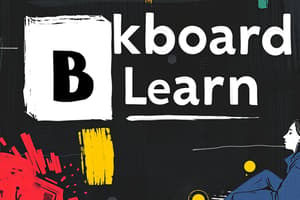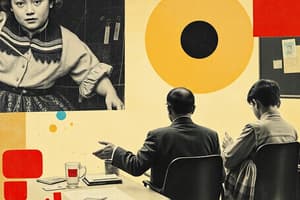Podcast
Questions and Answers
What is sociology?
What is sociology?
Sociology is one of the disciplines in the social sciences which aims to discover the ways by which the social surrounding influences people's thoughts, feelings, and behavior.
Which phases of self did Mead identify?
Which phases of self did Mead identify?
- I Self (correct)
- Me Self (correct)
- We Self
- You Self
Who is George Herbert Mead?
Who is George Herbert Mead?
George Herbert Mead is a sociologist who used the approach of social behaviorism to describe the power of the environment in shaping human behavior.
What is the 'looking-glass self'?
What is the 'looking-glass self'?
According to Erving Goffman, life is similar to a never-ending play.
According to Erving Goffman, life is similar to a never-ending play.
Match the following concepts with their definitions:
Match the following concepts with their definitions:
In the debate of human development, what are the two main factors being considered?
In the debate of human development, what are the two main factors being considered?
What discipline aims to discover how the social environment influences people's thoughts, feelings, and behavior?
What discipline aims to discover how the social environment influences people's thoughts, feelings, and behavior?
Who is known for the approach called social behaviorism?
Who is known for the approach called social behaviorism?
According to sociologists, what are the three key questions they investigate regarding the self?
According to sociologists, what are the three key questions they investigate regarding the self?
What does the 'Me Self' represent according to George Herbert Mead?
What does the 'Me Self' represent according to George Herbert Mead?
The three main steps of the looking-glass self are: People imagine how they appear to ______; People imagine how others are, thus judging them based on ______; People imagine how others feel about them based on ______.
The three main steps of the looking-glass self are: People imagine how they appear to ______; People imagine how others are, thus judging them based on ______; People imagine how others feel about them based on ______.
What concept did Charles Horton Cooley coin?
What concept did Charles Horton Cooley coin?
The I Self is characterized as a conventional, habitual individual.
The I Self is characterized as a conventional, habitual individual.
What does Erving Goffman's concept of 'impression management' refer to?
What does Erving Goffman's concept of 'impression management' refer to?
What is the debate regarding human development characterized by?
What is the debate regarding human development characterized by?
Flashcards are hidden until you start studying
Study Notes
Prayer for Gratitude and Guidance
- Acknowledgement of blessings and support from teachers, parents, and peers.
- Emphasis on the importance of attentiveness, patience, and diligence in learning.
Understanding the Self
- Focus on the perspectives of sociology and anthropology in the study of self.
Sociological Perspective of the Self
- Sociology explores how social environments influence thoughts, feelings, and behavior.
- Presents the self as a product shaped by modern society.
- Key sociological questions:
- How does society influence individual behavior?
- What impact does the individual have on society?
- How does one define themselves within the community?
George Herbert Mead's Contributions
- Developed Social Behaviorism emphasizing the environment's role in shaping behavior.
- Proposed that the self emerges through social experiences rather than being innate.
Stages of Self-Formation (Mead)
- Preparatory Stage: Children imitate significant others to learn the meaning of symbols.
- Play Stage: Children engage in role-taking, assuming various perspectives.
- Game Stage: Children understand their role within the broader social structure, considering societal rules.
Mead's Two Phases of Self
- Me Self: Represents the social self influenced by societal attitudes.
- I Self: Reflects the individual's unique response to societal expectations.
Charles Horton Cooley's Contributions
- Introduced the concept of the “looking-glass self”.
- Self-concept develops through social interaction, involving three steps:
- Imagining one's appearance to others.
- Judging others based on their perceptions.
- Understanding feelings based on those judgments.
Erving Goffman's Dramaturgical Approach
- Life described as a continuous play with individuals as actors.
- Concept of "impression management" focuses on how people control the perception others have of them.
- Sign Vehicles used in self-presentation:
- Social setting
- Appearance
- Mannerisms during interaction
Anthropological Perspective of the Self
- Engages in the debate of nature versus nurture regarding human development.
- Investigates how genetic and environmental factors contribute to identity formation.
Prayer for Gratitude and Guidance
- Acknowledgement of blessings and support from teachers, parents, and peers.
- Emphasis on the importance of attentiveness, patience, and diligence in learning.
Understanding the Self
- Focus on the perspectives of sociology and anthropology in the study of self.
Sociological Perspective of the Self
- Sociology explores how social environments influence thoughts, feelings, and behavior.
- Presents the self as a product shaped by modern society.
- Key sociological questions:
- How does society influence individual behavior?
- What impact does the individual have on society?
- How does one define themselves within the community?
George Herbert Mead's Contributions
- Developed Social Behaviorism emphasizing the environment's role in shaping behavior.
- Proposed that the self emerges through social experiences rather than being innate.
Stages of Self-Formation (Mead)
- Preparatory Stage: Children imitate significant others to learn the meaning of symbols.
- Play Stage: Children engage in role-taking, assuming various perspectives.
- Game Stage: Children understand their role within the broader social structure, considering societal rules.
Mead's Two Phases of Self
- Me Self: Represents the social self influenced by societal attitudes.
- I Self: Reflects the individual's unique response to societal expectations.
Charles Horton Cooley's Contributions
- Introduced the concept of the “looking-glass self”.
- Self-concept develops through social interaction, involving three steps:
- Imagining one's appearance to others.
- Judging others based on their perceptions.
- Understanding feelings based on those judgments.
Erving Goffman's Dramaturgical Approach
- Life described as a continuous play with individuals as actors.
- Concept of "impression management" focuses on how people control the perception others have of them.
- Sign Vehicles used in self-presentation:
- Social setting
- Appearance
- Mannerisms during interaction
Anthropological Perspective of the Self
- Engages in the debate of nature versus nurture regarding human development.
- Investigates how genetic and environmental factors contribute to identity formation.
Studying That Suits You
Use AI to generate personalized quizzes and flashcards to suit your learning preferences.




